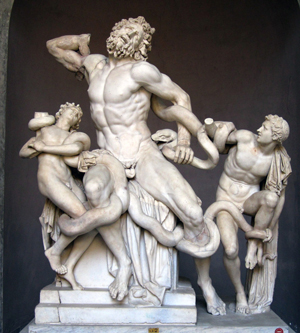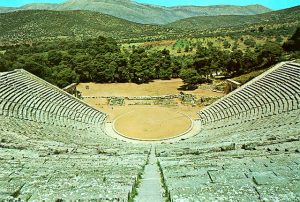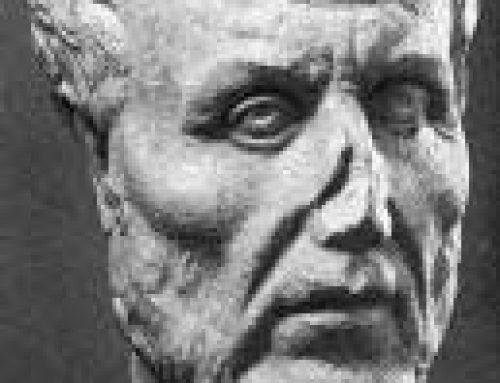
Nomos and physis: Laocoon: being strangled by snakes
People in ancient Greece often thought of the world as being a fight, or an agon, between the two forces of rationalism and chaos, or between law and nature. The Greeks called these two forces “nomos”, meaning law and order and rationalism, and “physis” (FU-sis), meaning nature (our word physics comes from this: physics is the study of nature). Chaos is what there was before there were gods; the gods came to bring order to the world, and the gods like order and hate chaos. (Compare this to the Hindu idea of dharma, equally descended from earlier Indo-European ideas, and then compare both of these to the Chinese idea of the Tao.)
Pretty much everything was either on the side of nomos (order) or on the side of physis (nature).
The god Apollo was the representative of nomos even among the gods; he was always fighting snakes and dragons and sea monsters, who represent physis for the Greeks. The snake-woman Medusa, who cannot control her own behavior even in Athena‘s temple, is an example of physis.
Men and women: nomos and physis
Women in general tend to be (in the view of Greek men) on the side of physis, while men are generally on the side of nomos: men can control themselves while women become hysterical (the word is Greek and it means to be taken over by your uterus). Men make and obey laws, but women do what comes naturally (like Phaedra or Medea, or the maenads in the Bacchae). How does this compare to the Chinese idea of yin and yang?

Greek theater at Epidauros (200 BC)
Mathematics, music, and architecture, which all follow strict sets of rules and attempt to order nature, are all good examples of nomos. Architecture brings space under control, music brings noise under control, and mathematics brings the infinite under control. For this reason, Greek men liked all three of these arts very much.
It’s possible that women express nomos by spinning and weaving, which also create order out of chaos. They take a mess of fleece, and transform it into useful thread and blankets and clothing.
Learn by doing: a spinning project
More about Greek philosophy
Bibliography and further reading about Greek philosophical ideas:
Greek Ethics (Key Texts), by Pamela M. Huby (1998). Pretty easy to read, for an adult’s book. Deals directly with nomos and physis.
Philosophy and Science in Ancient Greece: The Pursuit of Knowledge, by Don Nardo (2004). For teenagers. Don Nardo has written many books for young people about the ancient Greeks.
The Cambridge Companion to Greek and Roman Philosophy, edited by David Sedley (1997).




